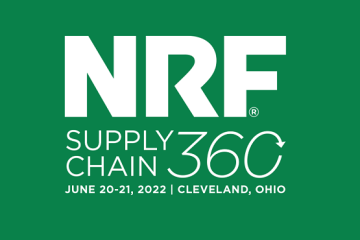
Recently, supply chains across industries have taken a devastating hit — and retail is no exception. As we prepare for NRF 2022: Retail’s Big Show starting January 16, 2022, we have handpicked more than 50 visionary tech startups across the retail industry to be featured at the Innovation Lab. The companies featured in the Innovation Lab are cutting-edge, investing in retail’s biggest opportunities like sustainable ecommerce and solving for its biggest problems including disruption to supply chains.
Entering the peak holiday season, containers carrying consumer goods are queued up in ports and shipping costs are at an all-time high. That’s partly because, in 2020 alone, consumers around the world spent $900 billion more online than in previous years. That unprecedented demand coupled with a widespread shortage of port workers is stretching supply chains thin. It’s even why you might see big retailers starting their Black Friday deals early in preparation for a busy two months heading into the holiday season.
Here are five 2022 Innovation Lab companies betting on solving critical supply chain issues and improving resiliency in the years to come.
Ohi transforms the post-purchase experience for consumers by partnering with brands to offer same-day, low emissions delivery. The company focuses on working with small businesses to help level the playing field against bigger retailers known for notoriously fast shipping. Powered by micro-fulfillment centers currently in New York City and Los Angeles and software analytics that helps brands predict demand, Ohi’s mission is to replace the current distribution system, which is far from environmentally friendly, resilient or forward-thinking (think massive warehouses and planes constantly flying long distances). Ohi is poised to be a game-changer for small businesses, making speedy fulfillment and distribution finally attainable, convenient and sustainable.
Toolio works with next-generation retailers like Outdoor Voices, Soludos and Summersalt to help navigate the complex retail landscape and keep track of their most important asset — inventory. Historically, merchandise planning has primarily been spreadsheet-driven, leading to bottlenecks, inefficiencies and often the wrong inventory in the wrong stores. By making everything available in the cloud, Toolio is revolutionizing the back end of the retail supply chain, a critical element of the process that hasn’t entirely caught up to the wave of innovation to the front end (e.g., Shopify and headless commerce).
DroneUp, a last-mile retail delivery solution using state-of-the-art drones, recently inked partnerships with massive retailers like Walmart with a mission to conduct drone deliveries at scale. Because of DroneUp’s expertise with unmanned aircraft systems, it can direct a coordinated network of delivery solutions across streets, sidewalks and the sky. Incorporating drones is predicted to help solve retail’s last-mile delivery problem by reducing delays, shortening delivery time and avoiding complicated logistics.
Logistics service platform Fillogic helps retailers get from Point A to Point Z along the supply chain, helping partners with everything from fulfillment to store deliveries. Its suite of solutions for retailers makes Fillogic a convenient, one-stop shop for offering a better customer experience and eliminating inefficiencies for retailers at the same time. It does this by building and operating micro-distribution hubs at malls to maximize the utilization of bricks-and-mortar stores. In a world where 5 million packages will be left on loading docks on any given day because of lack of capacity, Fillogic is helping bridge the gap between growing ecommerce demand and fulfillment — an imperative in today’s consumer-frenzy world.
Shelf Engine revolutionizes how grocery retailers buy perishables. It generates accurate orders for stores through intelligent operations-as-a-service forecasting that leans on machine learning and proprietary, predictive models. The technology is so accurate that Shelf Engine even promises grocers to buy back what they don’t sell. Given that 43 billion pounds of food are wasted yearly, food waste is one of the biggest problems for grocery retailers today, decreasing profit margins while being extremely harmful to the environment — a key issue that the company aims to tackle.


